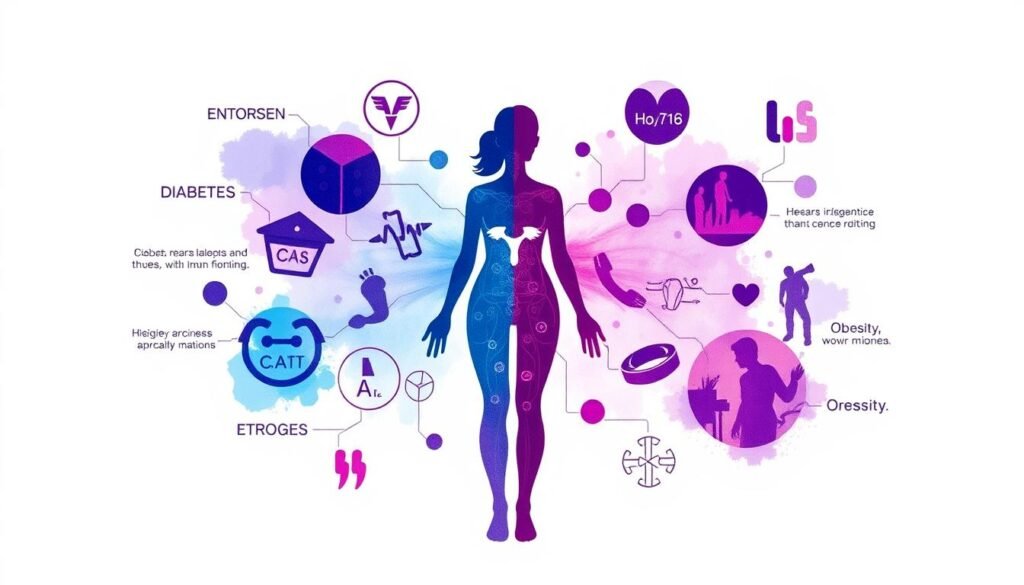Polycystic Ovary Syndrome (PCOS) touches about 1 in 10 women during their childbearing years. Surprisingly, up to 70% of women with PCOS are not diagnosed. This disorder greatly affects women’s health by disturbing their hormone levels. These changes can lead to issues like irregular periods, excess hair growth, and trouble getting pregnant. Knowing how PCOS affects hormone levels helps people make better health decisions.
Elevated estrogen levels can cause irregular menstrual cycles and increase the risk of endometrial hyperplasia in women with PCOS. A lack of progesterone, due to not ovulating, can make menstrual cycles irregular and getting pregnant difficult. Additionally, PCOS often results in higher testosterone levels, leading to symptoms like excessive hair and acne. Understanding these hormone imbalances provides insights into their health effects.
Environmental factors, including xenoestrogens from pesticides and plastics, play a role in these hormone disruptions. For more insights on how excess estrogen affects women with PCOS, check out understanding estrogen dominance in PCOS.
Key Takeaways
- PCOS is a hormonal disorder that affects 1 in 10 women in their fertility years.
- It causes hormone imbalances such as high estrogen, low progesterone, and increased androgens.
- This disorder can lead to irregular periods and challenges with fertility.
- Xenoestrogens in the environment can worsen these hormonal imbalances.
- Understanding these hormone changes is key to managing and treating PCOS effectively.
Understanding Polycystic Ovary Syndrome (PCOS)
Polycystic ovary syndrome (PCOS) changes the hormonal balance in women of childbearing age. It comes with symptoms like irregular periods, extra hair growth, and trouble getting pregnant. About 4-10% of women around the world face this issue, showing how common it is.
PCOS mainly involves three things: too many male hormones, problems with ovulating, and metabolic issues. A World Health Organization study found that 116 million women had PCOS in 2012. This points out the massive impact PCOS has worldwide and calls for more awareness.
Women between 20 and 30 years old are usually diagnosed with PCOS, but the symptoms can start earlier. It can even show up during pregnancy, which surprises many. 75-90% of women with PCOS and irregular periods also have high male hormone levels. This hormonal imbalance can lead to bigger problems like obesity and diabetes.
Several factors play into the cause of PCOS, such as hormone changes, insulin resistance, and inflammation. By understanding these factors, we can better recognize symptoms early. Early treatment can help manage the condition and lower the costs related to PCOS.
Hormonal Imbalances in PCOS
Polycystic ovary syndrome (PCOS) deeply affects many women, yet often goes unnoticed. Nearly 1 in 10 women of childbearing age face PCOS. However, over half are unaware they have it. The core issue in PCOS is a hormonal imbalance, with high androgens and estrogens but low progesterone. These hormonal shifts mess up the menstrual cycle. This can cause irregular periods, acne, excess hair, and weight gain.
PCOS often brings insulin resistance, adding to the body’s metabolic problems. This issue can hit even non-obese women with PCOS, making them more likely to suffer from it than women without PCOS. Insulin resistance leads to weight gain and obesity. This makes the hormonal imbalance worse and messes with metabolism.
To fight PCOS, doctors suggest losing weight and changing your lifestyle if you’re overweight. Using birth control pills can help balance hormones. Some diabetes drugs also help with PCOS symptoms. Because of the risk of cancer in the uterine lining, diabetes, and heart disease, addressing these imbalances is key.
| Complications Associated with Hormonal Imbalance | Potential Health Risks |
|---|---|
| Infertility | Increased risk of anovulation and difficulty in conceiving |
| Uterine lining cancer | Due to prolonged unopposed estrogen exposure |
| Diabetes | Linked to insulin resistance |
| Heart disease | Higher prevalence due to metabolic syndrome |
| Mood disorders | Increased risk of depression and anxiety |
Understanding and treating hormonal imbalances in PCOS is crucial. It’s not only important for reproductive health but for overall health too. Getting diagnosed early and starting treatment can make a big difference.
How PCOS Disrupts the Balance of Estrogen, Progesterone, and Androgens
PCOS significantly changes how essential hormones like estrogen, progesterone, and androgens work. It’s crucial to know how these hormones affect women’s health. This knowledge helps manage PCOS better.
The Role of Estrogen in Women’s Health
Estrogen is key for body processes such as the menstrual cycle and healthy reproduction. In PCOS cases, estrogen levels can be high. This happens due to more ovarian activity during hormonal imbalances. This increase affects estrogen’s function, leading to symptoms and health issues.
Consequences of Altered Estrogen Levels
High estrogen levels can change menstrual cycles, which is a common PCOS problem. These changes put women at risk of endometrial hyperplasia. This is when the uterine lining gets too thick. It can lead to worse health issues. High estrogen also makes fertility harder and disrupts hormonal balance.
Progesterone’s Importance in the Menstrual Cycle
Progesterone readies the uterus for embryo implantation. PCOS often causes low progesterone due to irregular ovulation. This can affect the luteal phase. It makes conceiving more difficult. Knowing progesterone’s role is key to understanding hormonal balance issues in PCOS women.
| Hormone | Function | Impact of Imbalance in PCOS |
|---|---|---|
| Estrogen | Regulates menstrual cycle and reproductive health | High levels can lead to menstrual irregularities and endometrial hyperplasia |
| Progesterone | Prepares the uterus for implantation | Deficiency may cause luteal phase defects and reproductive challenges |
| Androgens | Influences ovarian function and follicle development | Excess levels contribute to symptoms like acne, hirsutism, and ovulatory dysfunction |
The Effects of High Androgen Levels
Many women with polycystic ovary syndrome (PCOS) have high androgen levels. This includes elevated testosterone. Such a hormonal imbalance can cause various changes in the body. It disrupts how things normally work.
Understanding how high androgen levels affect people is key. It helps us see the challenges many women with PCOS face.
Impact of Elevated Testosterone in Women
High androgen levels are common in women with PCOS. They may face several health issues because of this. For instance, it can mess up how follicles develop. This might lead to ovarian cysts.
Such disruptions impact fertility and can cause issues like irregular periods and anovulation. These problems significantly harm reproductive health.
Symptoms Associated with High Androgens
The symptoms of high androgens can greatly affect a woman’s life. Some common ones include:
- Hirsutism: This means unwanted hair growth on the face, chest, and back.
- Acne: High androgen levels can cause a lot of acne, especially in adult women.
- Male-pattern hair loss: This is when hair thins out because of high androgens.
Treating these symptoms is crucial. It can make a big difference in the mental and physical health of women with PCOS. Many treatments aim at lowering high androgen levels. This can improve symptoms like hirsutism and acne, leading to a better life.
| Symptom | Description |
|---|---|
| Hirsutism | Excess hair growth in areas typical for males. |
| Acne | Persistent breakouts due to hormonal imbalance. |
| Male-pattern hair loss | Thinning of hair, particularly at the temples and crown. |
Irregular Periods and Anovulation in PCOS
Polycystic ovary syndrome (PCOS) is common among women around the world. It mainly causes menstrual problems and infertility issues. Women with PCOS often face irregular periods. They might have cycles that come rarely, last too long, or do not happen at all. This menstrual cycle disruption is due to hormonal imbalances stopping normal ovulation.
Anovulation means no ovulation happens. It’s a key sign of PCOS. Because of this, women might not release eggs often. This makes getting pregnant hard. Sadly, up to 70% of women with PCOS don’t know they have it. This leaves many unaware of how it affects their chance to have a baby.
In PCOS, not only do periods become irregular, but testosterone levels might also go up. This can lead to heavy or too long periods. If this happens, talking to a doctor for possible treatments is wise. Eating well, staying active, and keeping a healthy weight can help manage these symptoms.
If you’re having these issues, it’s important to see a doctor. Knowing about PCOS helps with early detection and treatment. By working with your doctor, you can keep an eye on hormone levels and menstrual cycles. For more details, read more about PCOS.

| Symptoms of PCOS | Description |
|---|---|
| Irregular Periods | Cycles that are infrequent, prolonged, or absent. |
| Anovulation | Failure to ovulate monthly, impacting fertility. |
| Heavy Bleeding | Experience of heavy or prolonged menstrual bleeding. |
| Hormonal Imbalance | Elevated testosterone and disrupted estrogen levels. |
Weight Gain and Metabolic Issues Related to Hormone Imbalance
Polycystic Ovary Syndrome (PCOS) affects 5–10% of women in their reproductive years. Many women with PCOS find it hard to avoid gaining weight. This is because of insulin resistance, where the body doesn’t use insulin well.
High insulin levels cause the ovaries to make more androgens. This worsens weight gain and metabolic problems. It’s a cycle that’s hard to break.
Insulin Resistance and Its Connection to PCOS
Insulin resistance plays a big role in PCOS, touching even those at a healthy weight. High insulin levels lead to more body fat and higher risks of diabetes and heart diseases. For women with PCOS, this matter is crucial.
This condition affects not just the reproductive organs but the whole body’s metabolism. It shows how hormones and metabolism are closely linked.
- Women with PCOS often experience higher-than-normal levels of androgens.
- This hormonal imbalance is linked to symptoms such as weight gain, hirsutism, and acne.
- Insulin resistance can make it challenging to maintain a healthy weight, ultimately leading to obesity.
- Addressing these metabolic issues is essential for managing PCOS effectively and reducing long-term health risks.
It’s important to understand how hormonal imbalances influence weight and metabolism. Making lifestyle changes is key. A good diet and exercise can help manage PCOS symptoms.
Fertility Challenges in Women with PCOS
Women with Polycystic Ovary Syndrome (PCOS) often struggle to get pregnant due to hormonal imbalances. These issues can interrupt the normal ovulation process, making it hard to conceive. Many experience irregular or absent periods, a key sign of PCOS.
Impact of Hormonal Imbalance on Ovulation
Hormonal imbalance in PCOS leads to inconsistent ovulation. This can greatly reduce fertility, raising concerns about infertility. The high androgen levels, like testosterone, upset the hormone balance needed for ovulation. It makes getting pregnant more difficult.
Considerations for Conception
To improve chances of conception, addressing hormonal imbalances is critical. Lifestyle changes, such as diet and exercise, can boost fertility. Medical treatments, including ovulation-inducing drugs and IVF, are also options. These combined efforts can overcome fertility challenges from PCOS, increasing the chance of success. Insights on lifestyle improvements are available here.

| Treatment Options | Description |
|---|---|
| Ovulation Induction | Medications like Clomid or Letrozole help stimulate ovulation. |
| Intrauterine Insemination (IUI) | A procedure that places sperm directly into the uterus during ovulation. |
| In Vitro Fertilization (IVF) | Involves extracting eggs, fertilizing them in the laboratory, and transferring embryos into the uterus. |
| Lifestyle Changes | Dietary adjustments and regular exercise to help manage weight and hormone levels. |
| Acupuncture | Alternative therapy that may help regulate the menstrual cycle and improve egg quality. |
Managing Hormonal Imbalances in PCOS
Handling hormonal imbalances in Polycystic Ovary Syndrome (PCOS) includes both lifestyle and medical approaches. Knowing how they work together helps people manage their health better.
Lifestyle Modifications for Hormonal Balance
Making lifestyle changes is key in managing hormonal imbalances. Small changes in habits can greatly affects hormones and health. Some effective strategies are:
- Balanced Diet: Eating whole foods like fruits, vegetables, lean meats, and whole grains helps with weight and hormones.
- Regular Exercise: Staying active helps keep weight in check and fights insulin resistance, aiding hormone balance.
- Stress Management: Yoga, meditation, and deep breathing reduce stress, which affects hormones.
- Sleep Hygiene: Getting good sleep is important for hormone production and balance.
Medications and Treatment Options
If hormonal imbalances are severe, medications might be needed. Talking to a doctor can lead to a treatment plan that may include:
- Oral Contraceptives: These help control menstrual cycles and lower symptoms of high androgen levels.
- Anti-androgens: Drugs like spironolactone can lower the effects of high male hormones.
- Insulin Sensitizers: Metformin helps improve how the body uses insulin, which is good for insulin resistance.
- Hormonal Treatments: Hormone therapy adjustments might be needed, depending on the person’s hormone levels and symptoms.
Combining lifestyle changes with the right medications can improve life quality a lot. This approach lets people actively manage their health, aiming for balanced hormones.
Long-term Health Risks Associated with PCOS
Polycystic ovary syndrome (PCOS) is linked with several long-term health risks. This issue is a major concern for many women. Those affected are more likely to get chronic conditions like diabetes and cardiovascular diseases.
Women with PCOS often have higher insulin levels. This makes serious health problems more likely to happen.
Between 4% and 21% of women of childbearing age have PCOS. This suggests that around 116 million women worldwide are affected. PCOS usually starts between 20 and 30 years old. Knowing the long-term effects of PCOS is crucial.
Studies show more women are facing health problems because of PCOS. There’s been more than a 30% increase in some cases since 1990. Many women with PCOS aren’t happy with their treatment. They say it doesn’t effectively reduce long-term health risks or manage symptoms.
PCOS also has a big economic impact because of high healthcare costs. Women with PCOS often experience reduced life quality. They also face more mental health issues.

Understanding these risks shows why better care and tailored treatments are essential. Women with PCOS should make lifestyle changes early. This can help avoid worse health problems later, leading to a healthier life.
| Health Risk | Description |
|---|---|
| Diabetes | Women with PCOS face a higher risk of developing type 2 diabetes due to insulin resistance. |
| Cardiovascular Diseases | The condition increases the likelihood of hypertension and heart disease, stressing the need for regular health assessments. |
| Mental Health Issues | PCOS is associated with adverse mental health outcomes, including anxiety and depression. |
| Obesity | Many women with PCOS experience weight gain, which further exacerbates other health risks. |
Current Research and Future Directions in Understanding PCOS
Research today brings fresh insights into polycystic ovary syndrome (PCOS). It’s focused on hormonal interactions affecting women’s health. Reports show 9% to 18% of women of childbearing age worldwide have PCOS. This makes it key for study. Efforts are aimed at bettering how we understand and treat PCOS to help patients more.
About 60% to 80% of women with PCOS also struggle with insulin resistance. This issue can make PCOS worse, leading to obesity and type 2 diabetes. This highlights the need for effective treatments. Moreover, studies link lower income levels with higher PCOS rates, pointing towards the need for specific health interventions.
Recent work has shown genetics play a big part in PCOS’s nature. This knowledge helps to tailor patient care based on their genetic background. The challenge of hormonal imbalances, like excess male hormones and ovulation issues, drives the search for new treatments. These could significantly ease symptoms for those affected.
| Statistic | Value |
|---|---|
| PCOS Prevalence in Developed Countries | 6-10% |
| Women with Insulin Resistance | 60-80% |
| Couples Seeking Infertility Treatment Affected by PCOS | Up to 30% |
| Women Experiencing Anovulation | Up to 95% |
| Women Displaying Hyperandrogenism | Approximately 60% |
| PCOS Patients with Polycystic Ovaries | 17-33% |
| PCOS Prevalence in African American Women | 8.0% |
| PCOS Prevalence in Caucasian Women | 4.8% |
| PCOS and Cardiovascular Risk | Increased |
| First-Degree Relatives with PCOS Risk | 30%-50% |
There have been big changes in how we diagnose PCOS over the past 30 years. Different guidelines have helped doctors identify and treat it better. Looking forward, the future seems bright for managing PCOS. Researchers are finding ways to meet the individual needs of women fighting this condition.
Conclusion
Polycystic Ovary Syndrome (PCOS) is a complicated hormone problem. It disrupts the balance of estrogen, progesterone, and androgens. People with PCOS often face issues like irregular periods, weight gain, and problems getting pregnant.
Understanding these hormone imbalances is key to handling PCOS well. Managing PCOS well is crucial. It often involves changing your lifestyle, getting medical treatment, and checking hormone levels regularly. By looking at things like LH to FSH ratios and testosterone levels, doctors can create treatments that fit each woman’s needs.
This careful, personalized method can ease symptoms and improve reproductive health. As we learn more about PCOS, new and better treatments are being found. This gives women dealing with these hormone issues new hope. They can look forward to a better life despite PCOS’s challenges. Handling PCOS carefully helps women regain their health and wellness.